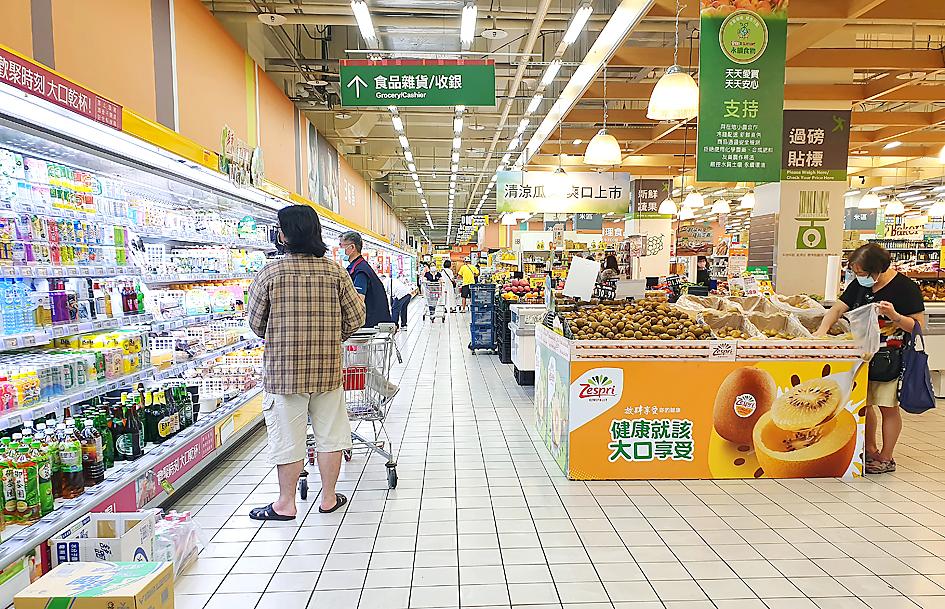Hypermarket chains generated NT$161.1 billion (US$5.75 billion) in sales in the first eight months of the year, up 3.6 percent year-on-year, as purchases of food and daily necessities increased amid a local COVID-19 outbreak, even though sales derived from their food courts dropped due to a nationwide ban on dine-in services, the Ministry of Economic Affairs said in a report on Friday.
Additionally, as hypermarket chains accelerated development of their online shopping platforms this year, riding the post-pandemic trend of offline consumption transitioning to online, they saw Internet sales increase by 49.2 percent year-on-year during the eight-month period.
This was higher than the 0.2 percent growth in physical store sales over the same period, the ministry said.

Photo: Chen Chih-chu, Taipei Times
“The proportion of online sales increased from 3.7 percent last year to 5.1 percent this year, which became another driving force for hypermarket chains’ revenue growth,” it said.
Major hypermarket players in Taiwan include Carrefour Taiwan (家樂福), Far Eastern A-Mart Co (遠東愛買) and RT-Mart International Ltd (大潤發). These brands provide a diverse range of products to meet consumers’ demand for bargains and one-stop shopping, leading sales to continued growth in the past few years.
Last year, due to panic buying amid the escalating COVID-19 situation and the contribution of the government’s Triple Stimulus Voucher program, along with the effects of rising online shopping and store expansion, hypermarket chains reported sales growth by the largest annual pace since 2011, up 8.9 percent to NT$228.7 billion, the ministry said.
Sales data showed that food products led by 42.4 percent last year, followed by household appliances with 20.3 percent, while beverages, tobacco and alcohol items accounted for 11.3 percent to rank third, the ministry said.
The peak sales periods were in January to February and July to August, as customers purchased goods ahead of the Lunar New Year holiday in winter, and the Ghost Festival and Mid-Autumn Festival in summer, it said.
Facing challenges such as price competition, low gross profit and rising labor costs, hypermarket chain operators expect that their e-commerce models and improved marketing strategies should bring consumers closer to their stores, boosting customer loyalty, frequency of purchases and revenue growth, the ministry said.
Hypermarket chains are also entering the supermarket business as they aim to expand business scale and reduce procurement costs, while boosting resource integration and distribution efficiency, the ministry said.
Carrefour last year acquired supermarket chain Wellcome Taiwan Co (惠康百貨) for US$112.5 million, a move that gave it ownership of all Wellcome supermarkets and Jasons Market Place outlets in Taiwan.
“With the changes in family structure and consumer behavior, coupled with fierce competition in the industry, hypermarket chains have gradually penetrated into local communities and focused on supermarket stores, in addition to large shopping malls,” the ministry said. “This strategy will help them grow revenue and rapidly increase market share.”
As of the end of August, hypermarket chains operated 373 stores in Taiwan, an increase of 186 from the end of last year. Among them, 183 were supermarkets gained through mergers and acquisitions, the ministry’s tally showed.

Anna Bhobho, a 31-year-old housewife from rural Zimbabwe, was once a silent observer in her home, excluded from financial and family decisionmaking in the deeply patriarchal society. Today, she is a driver of change in her village, thanks to an electric tricycle she owns. In many parts of rural sub-Saharan Africa, women have long been excluded from mainstream economic activities such as operating public transportation. However, three-wheelers powered by green energy are reversing that trend, offering financial opportunities and a newfound sense of importance. “My husband now looks up to me to take care of a large chunk of expenses,

SECTOR LEADER: TSMC can increase capacity by as much as 20 percent or more in the advanced node part of the foundry market by 2030, an analyst said Taiwan Semiconductor Manufacturing Co (TSMC, 台積電) is expected to lead its peers in the advanced 2-nanometer process technology, despite competition from Samsung Electronics Co and Intel Corp, TrendForce Corp analyst Joanne Chiao (喬安) said. TSMC’s sophisticated products and its large production scale are expected to allow the company to continue dominating the global 2-nanometer process market this year, Chiao said. The world’s largest contract chipmaker is scheduled to begin mass production of chips made on the 2-nanometer process in its Hsinchu fab in the second half of this year. It would also hold a ceremony on Monday next week to

TECH CLUSTER: The US company’s new office is in the Shalun Smart Green Energy Science City, a new AI industry base and cybersecurity hub in southern Taiwan US chip designer Advanced Micro Devices Inc (AMD) yesterday launched an office in Tainan’s Gueiren District (歸仁), marking a significant milestone in the development of southern Taiwan’s artificial intelligence (AI) industry, the Tainan City Government said in a statement. AMD Taiwan general manager Vincent Chern (陳民皓) presided over the opening ceremony for the company’s new office at the Shalun Smart Green Energy Science City (沙崙智慧綠能科學城), a new AI industry base and cybersecurity hub in southern Taiwan. Facilities in the new office include an information processing center, and a research and development (R&D) center, the Tainan Economic Development Bureau said. The Ministry

ADVERSARIES: The new list includes 11 entities in China and one in Taiwan, which is a local branch of Chinese cloud computing firm Inspur Group The US added dozens of entities to a trade blacklist on Tuesday, the US Department of Commerce said, in part to disrupt Beijing’s artificial intelligence (AI) and advanced computing capabilities. The action affects 80 entities from countries including China, the United Arab Emirates and Iran, with the commerce department citing their “activities contrary to US national security and foreign policy.” Those added to the “entity list” are restricted from obtaining US items and technologies without government authorization. “We will not allow adversaries to exploit American technology to bolster their own militaries and threaten American lives,” US Secretary of Commerce Howard Lutnick said. The entities